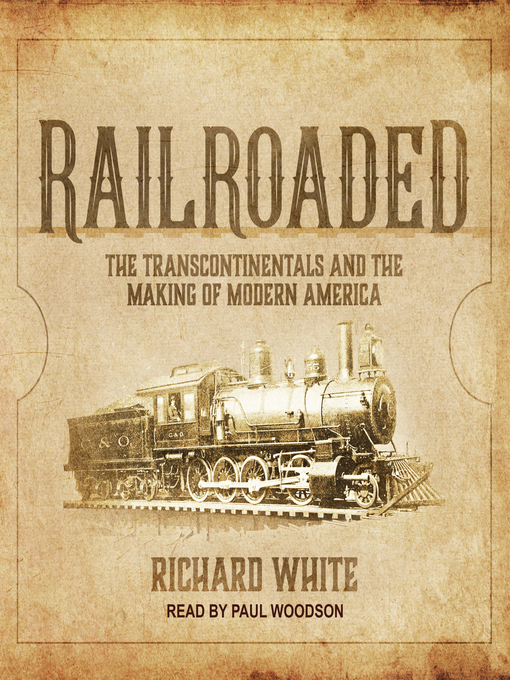Railroaded
The Transcontinentals and the Making of Modern America
With characteristic originality, range, and authority, Richard White shows the transcontinentals to be pivotal actors in the making of modern America. But the triumphal myths of the golden spike, robber barons larger than life, and an innovative capitalism all die here. Instead we have a new vision of the Gilded Age, often darkly funny, that shows history to be rooted in failure as well as success.
-
Creators
-
Publisher
-
Release date
June 5, 2018 -
Formats
-
OverDrive Listen audiobook
- ISBN: 9781541497924
- File size: 665223 KB
- Duration: 23:05:52
-
-
Languages
- English
-
Reviews
-
AudioFile Magazine
Narrator Paul Woodson does a marvelous job with this audiobook. His deep, resonant voice brings to mind nineteenth-century intonations and pronunciations. Narrating at a lively clip, he has a command of the author's intent, pausing and accentuating for effect and to create dramatic tension. What makes Woodson's job a bit easier is that he's narrating history written by one of the giants in the field. The story of the building of the western railroad after the Civil War is a story of America itself. There's greed, ambition, the public good, racism, government involvement, and the wealthy industrialists, known as the Big Four--Stanford, Huntington, Crocker, and Hopkins--who got it done. R.I.G. © AudioFile 2019, Portland, Maine -
Publisher's Weekly
Starred review from March 21, 2011
The transcontinental railroads "created modernity as much by their failure as by their success," writes MacArthur fellow and Parkman Prizeâwinning historian White in this important and deeply researched history. Often poorly built and with no real demand for their services the railroads never paid for themselves and left chaos in their wakeâe.g., displaced Native Americans, environmental disaster through encouraging the farming of nonarable land. Experienced railway men weren't interested in investing in transcontinental routes, writes White (The Frontier in American Culture), so six Sacramento businessmen (who formed the Central Pacific) and a slapdash federally chartered corporation (the Union Pacific) took the bait of money and land offered by the federal government. Their first act was to bribe Congress to increase land grants and relax restrictions on raising money. Then the race was on. Readers will be amazed, amused, and disgusted by the antics of obscure and familiar names (Stanford, Huntington, Dodge), mostly ignorant of railroading and spectacularly dishonest. White delivers an opinionated, delightfully witty but astute account of sleazy Gilded Age politics, business, and journalism, as well as the complex (but uncomfortably familiar) financial maneuvers men used to enrich themselves. Maps, charts.
-
Loading
Why is availability limited?
×Availability can change throughout the month based on the library's budget. You can still place a hold on the title, and your hold will be automatically filled as soon as the title is available again.
The Kindle Book format for this title is not supported on:
×Read-along ebook
×The OverDrive Read format of this ebook has professional narration that plays while you read in your browser. Learn more here.


